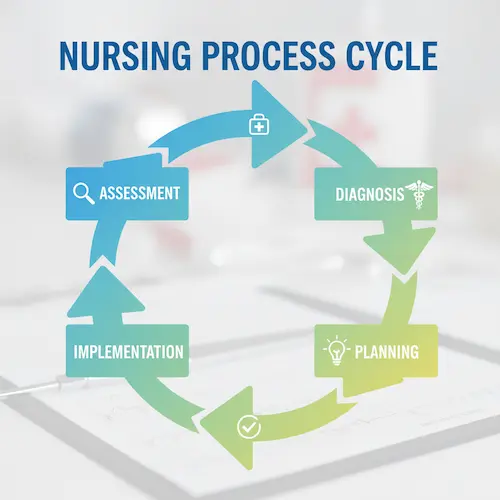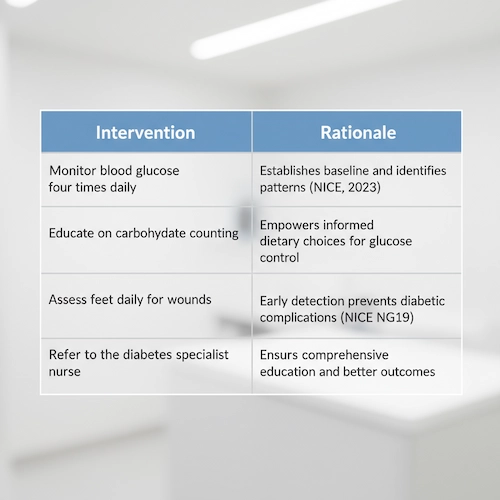What is a Nursing Care Plan?
A nursing care plan is a formal, written document that outlines the nursing care a patient will receive. It's developed using the nursing process and serves as a roadmap for delivering individualized, evidence-based care.
Key Purposes:
- Continuity of Care: Ensures all healthcare team members understand patient needs
- Documentation: Provides legal evidence of care planning and delivery
- Patient-Centered Approach: Focuses on individualized patient outcomes
- Quality Assurance: Maintains standards set by the Nursing and Midwifery Council (NMC)
- Academic Development: Demonstrates your understanding of nursing theory and practice
The Essential Components of a Nursing Care Plan

1. Assessment
The foundation of your care plan includes:
Subjective Data:
- Patient's reported symptoms
- Pain levels
- Concerns and feelings
- Medical history
Objective Data:
- Vital signs (BP, temperature, pulse, respirations)
- Physical examination findings
- Laboratory results
- NEWS2 scores
2. Nursing Diagnosis
Use NANDA-I format or UK-recognized frameworks:
Structure (PES):
- Problem
- Etiology (related to)
- Signs/Symptoms (as evidenced by)
Examples:
- "Deficient Knowledge related to new diabetes diagnosis as evidenced by the patient's statement 'I don't know what to eat'"
- "Risk for Unstable Blood Glucose Level related to inadequate monitoring and deficient knowledge"
3. Goals and Outcomes
All goals must be SMART:
- Specific
- Measurable
- Achievable
- Relevant
- Time-bound
Short-term Goal:
"Patient will demonstrate proper blood glucose testing technique within 3 days."
Long-term Goal:
"Patient will achieve HbA1c below 53 mmol/mol within 3 months"
4. Nursing Interventions
Specific actions with evidence-based rationales:

5. Evaluation
In nursing care plans, evaluation determines whether patient goals have been met and if interventions are effective. The same principle applies to your academic journey—review what you’ve achieved and identify what still needs work.
Step-by-Step Guide Provided by My Perfect Writing: How to Write a Nursing Care Plan
Writing a clear, patient-focused nursing care plan is a fundamental skill for every BSc Nursing student. Whether you're tackling your first placement or working on a detailed assignment, following a structured clinical documentation approach helps you deliver safer care—and stronger academic work.
This guide combines evidence-based practice, UK standards, and academic insight, making it especially useful if you're looking for support from nursing paper writing services or reliable nursing assignment helpers.
Step 1: Conduct a Comprehensive Assessment
Begin by gathering detailed patient data. A strong assessment underpins every decision in the care plan.
- Health history, allergies, medications
- Vital signs and physical examination
- Psychosocial, environmental, and cultural factors
- Use UK tools: NEWS2, Waterlow Score, and MUST Score
- Consider risks such as falls, infection, and pressure ulcers
Need help with clinical assessment formats? Our trusted nursing essay writing service UKcan guide you through evidence-based structuring and referencing.
Step 2: Identify Key Nursing Diagnoses
Interpret the data and prioritise problems using recognised frameworks.
- Analyse findings to detect actual and potential complications
- Group symptoms logically
- Use NANDA-I standard diagnoses for academic clarity
- Apply Maslow’s Hierarchy or the ABC approach for clinical safety
Example: If a patient presents with shortness of breath and fatigue, a diagnosis like “Impaired Gas Exchange” might be prioritised—a common scenario often explored in clinical assignments and case studies supported by My Perfect Writing.
Step 3: Set Patient-Centered SMART Goals
Define goals that are realistic, time-bound, and focused on measurable outcomes.
- Engage the patient in goal setting
- Examples: “Patient will report pain <3/10 within 30 minutes post-intervention”
- Make goals SMART: Specific, Measurable, Achievable, Relevant, Time-based
Whether you're writing for clinical records or an academic task, SMART goals show critical thinking—essential for high-scoring assignments.
Step 4: Plan Evidence-Based Interventions
Design targeted actions supported by clinical guidelines.
- List nursing interventions clearly (e.g., “administer 2L oxygen via nasal cannula”)
- Include frequency and timing (e.g., “monitor blood pressure every 4 hours”)
- Justify each action using NICE Guidelines or NHS Trust protocols
- Refer to trusted UK sources like NICE Guidelines and NHS Trust protocols
When deadlines are tight, many students turn to last minute assignment help to make sure their interventions are well-supported and cited correctly.
Step 5: Implement the Care Plan
Time to put your planning into action.
- Carry out the interventions step-by-step
- Monitor and record patient responses
- Communicate updates with the healthcare team
- Ensure all actions are documented accurately in line with UK nursing standards
Pay just 25% Upfront for Nursing Essay Help with My Perfect Writing – start your assignment now and pay the rest later.
Step 6: Evaluate and Update the Plan
Evaluation closes the loop and reflects on care outcomes.
- Review whether the goals were met, partially met, or unmet
- Reassess the patient using the same tools from Step 1
- Modify the plan as needed—change interventions, set new goals, or escalate care
- For assignments, include a rationale for each change and reference clinical evidence
Example: If your goal was “Patient will mobilise 20 metres unassisted,” and they only manage 5 with aid, revise your plan and justify the adjustment.
Ready to Excel in Your Nursing Care Plan Assignments?
Don't let challenging care plan assignments hold you back from achieving your nursing career goals. Get expert guidance from My Perfect Writing's specialized nursing assignment help UK team today. Whether you're drafting a care plan for chronic illness or writing a reflective essay on your placement, we’re here to support your academic journey with precision and care.
Get personalized support with:
- Care plan structure and formatting
- Evidence-based rationale development
- NICE guideline integration
- Proofreading and editing
- NMC standards alignment
- 24/7 professional support
📞 Contact Our Expert Team Today →
Your success is our priority. Let us help you master nursing care plans and build a strong foundation for your nursing career.
Frequently Asked Questions
What is the best way to structure a nursing care plan for UK assignments?
A nursing care plan should follow the nursing process: assessment, diagnosis, planning, intervention, and evaluation. Use NANDA-I diagnoses, SMART goals, and cite evidence from NICE guidelines and NMC standards.
How can I make sure my nursing care plan meets academic standards in the UK?
Stick to NMC standards, use UK-relevant tools (NEWS2, MUST, Waterlow), and include rationales based on NICE or NHS protocols. Services like My Perfect Writing can review your plan for clarity and accuracy.
Can I get help with a last-minute nursing care plan assignment?
Yes! Platforms offering last minute assignment help, like My Perfect Writing, provide urgent academic support from expert nursing writers—even with 24–48-hour deadlines.
What are common mistakes students make in care plans?
Common errors include vague goals, missing rationales, incorrect diagnosis structure (not using PES format), and lack of evidence. Always follow a clear structure and reference UK guidelines.
Do nursing assignment writing services follow NMC and NICE standards?
Reputable services like My Perfect Writing ensure all nursing assignments align with NMC expectations and reference NICE guidelines to support clinical accuracy and academic integrity.
Meet Our Professional Essay Writers
Empowering Your Academic Writing Journey with Authority, Expertise, and Experience
Dr. Emma Wilson
PhD in Literature
Prof. James Chen
MSc in Computer Science
Dr. Sarah Ahmed
PhD in Law & Ethics
Ready to Work With Our Expert Writers?







